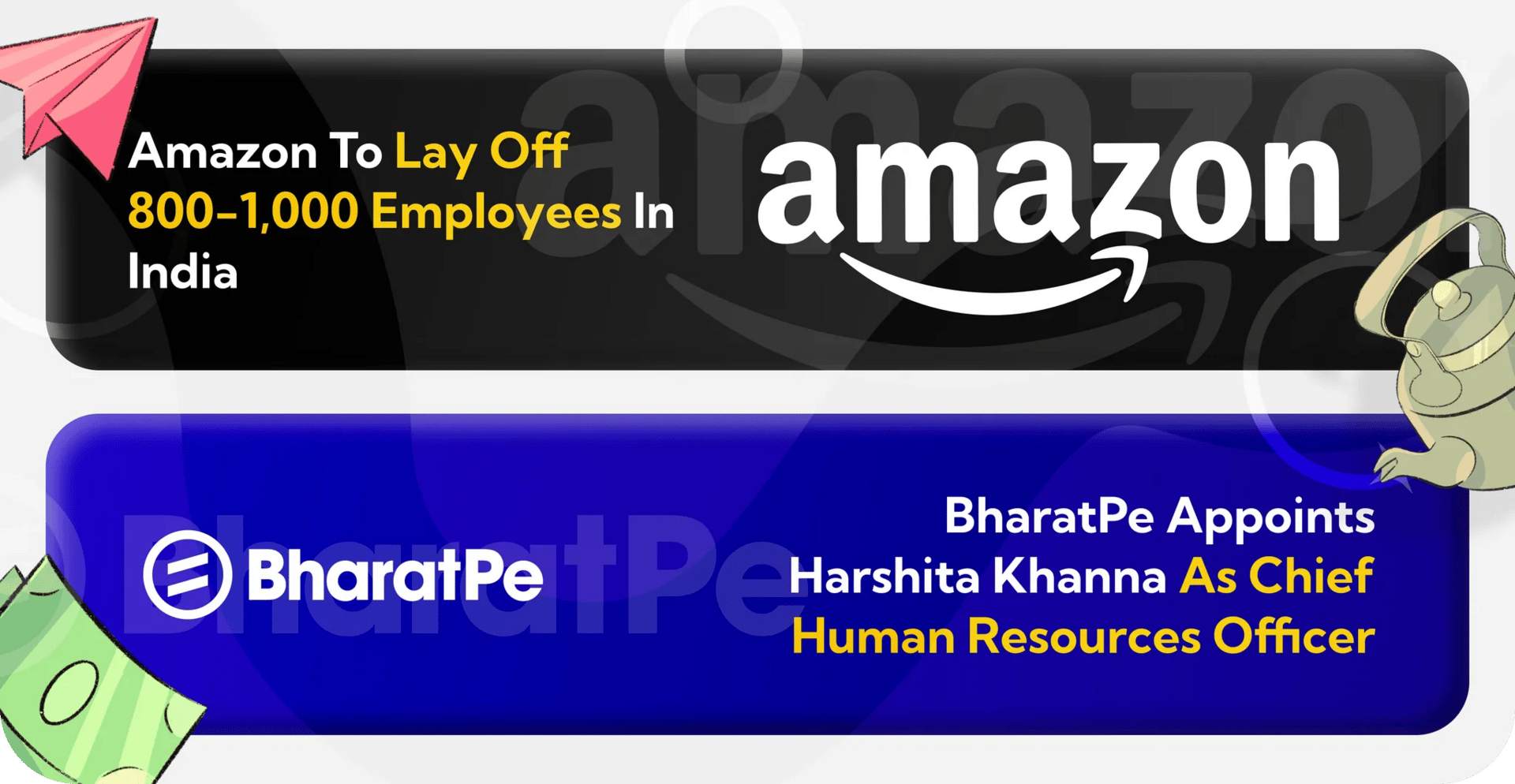- Startup Chai
- Posts
- Bira’s Hangover, Amazon’s Layoffs, and Heritage Foods’ Acquisition
Bira’s Hangover, Amazon’s Layoffs, and Heritage Foods’ Acquisition
Plus BharatPe’s New CHRO, and fundraising news about PointAI, IntrCity SmartBus, and SalarySe

Bira is one of the rare Indian beer brand that didn’t just steal share - it made new drinkers. A light, low-bitterness taste profile, playful branding (the monkey, the reversed B), smart pricing between cheap lagers and pricey imports, and early “brew it in Belgium, sell it in India” quality theatre turned it into an urban badge for millennials. Revenue raced to ~₹824 crore at its peak, volumes to ~9 million cases, and blue-chip backers lined up - first Sequoia/Sofina, then Kirin, which ultimately became the largest shareholder. For a moment it looked like the script had cracked: premiumisation in a mass market, taprooms for direct feedback, even an acquisition of The Beer Café to control the last mile. Underneath, though, the operating truth of Indian alcobev never changed: beer is taxed by volume, not alcohol content; state rules, labels and permits differ everywhere; advertising is effectively banned; working capital swings with summer; and incumbents enjoy scale no startup can rent. Even great gross margins can’t outrun excise math, fragmented licensing, and heavy distribution spend forever.
The unravelling had a single visible trigger and many hidden causes. The visible one: B9 Beverages converted from “Private Limited” to “Limited” to prepare for an IPO. In any normal sector that’s paperwork; in alcohol, states treated it as a “new entity.” Overnight, product labels, plant licences, distribution permits - all had to be re-applied, state by state, with no grace period. Sales in key markets froze for months, finished goods worth ~₹80 crore expired in warehouses, and FY24 revenue fell ~22% even as the cost base barely moved. Losses spiked to ~₹749 crore and, for the first time, annual losses exceeded annual revenue; the auditor issued a going-concern warning noting accumulated losses crossing ~₹1,900 crore and a current-liability overhang. That wasn’t just a bad year; it changed how everyone priced the risk of the business.
The hidden causes were structural and self-inflicted. Structural, because India taxes beer so heavily that 65-80% of retail price is tax in many states; because seasonality forces you to build inventory before summer and sit on idle capacity after; because you can’t market directly, so you burn cash on surrogate exposure with fuzzy ROI; and because a state policy flip (Delhi, Andhra Pradesh) can erase a year’s demand plan overnight. Self-inflicted, because capacity sat under-utilised when cash ran short; because expiry losses ballooned well above industry norms; because the company chased breadth (geographies, SKUs, adjacencies) while distribution relationships frayed; and because the governance muscle was thin for a company of this scale. When the cash crunch hit, the people damage followed: delayed salaries and statutory deposits, petitioning employees, and a credibility gap with vendors and lenders. That erosion of trust is harder to fix than a licence.
Then came the sting in the tail: the profitable hedge - The Beer Café - was pledged to lenders and investors; after defaults, Kirin and Anicut invoked the security and took control. Courts are now in the frame, but the message to the market is already clear: creditors will ring-fence good assets when parent liquidity is in doubt. Elsewhere, prospective debt deals fell away, a rights issue offered only temporary relief, and production restarted patchily as licences crawled back. Meanwhile, rivals filled the shelves Bira vacated in its strongest corridors. In premium beer, absence doesn’t keep your spot warm.
So what’s the honest read on “why Bira fell?” Because it tried to build a national beer company in a country where every state is a different country; because it optimised for growth in a category whose unit economics punish newcomers; and because it treated compliance like a box to tick, not a strategic function to over-invest in. The name-change fiasco is the headline, but the footnotes - seasonality, tax, policy volatility, distribution strain, weak internal controls - were always going to test the model.
Where can this go from here? The base-case is investor-led triage. Kirin owns the largest equity slice and has already acted like a control-minded creditor. A pragmatic reset would professionalise management, narrow the playbook to a few high-margin SKUs in cash-accretive states, slash working-capital cycles, and make hotel/attach-style metrics for outlets the north star instead of brand vanity.
A more decisive path is outright acquisition. With brand equity still meaningful (awards, recall, on-premise love) but the parent’s balance sheet broken, a strategic acquisition can convert debt to equity and consolidate at a price that would have been unthinkable two years ago. For a global brewer, buying a loved Indian badge is cheaper than building one from scratch.
The downside is slow bleed: more license delays, more lost shelf space, more vendor suits, and a spiral into formal insolvency where trademarks and plant slots get sold piecemeal.
There’s a wider lesson here for founders: in sectors like alcohol, aviation, gaming, lending, and health, compliance is not a cost centre; it’s your go-to-market. If you must spend, spend to shorten cash cycles and de-risk operations, not to win glamour impressions you can’t legally convert. Bira showed how to create demand; its second act - if it gets one - will depend on mastering the boring stuff that keeps the taps open.
Let’s go through what else is happening in Indian startup world - Grab your simmering cup of StartupChai.in and unwind with our hand-brewed memes.

“Apna Apna Dekh Lo”: Amazon To Lay Off 800-1,000 Employees In India
Amazon is reportedly gearing up for another round of layoffs in India, affecting around 800 to 1,000 employees across finance, marketing, HR, and tech teams.
This move is part of the company’s global restructuring, following Beth Galetti’s announcement of 14,000 job cuts worldwide. Ironically, it’s déjà vu for India as Amazon had trimmed a similar number of roles back in 2023.
Read more here


“Jo Tera Hai Wo Mera Hai”: Heritage Foods Acquires Majority Stake In Dessert Brand Get-A-Way
Heritage Foods has scooped up a majority stake in healthy dessert startup Get-A-Way, buying out Biryani By Kilo’s share from its 2022 investment.
The dairy giant now holds the larger spoon in the bowl, with an option to lick up another 20% stake after March 2026. Founded in 2018, Get-A-Way is known for its guilt-free frozen delights like protein-packed ice creams, popsicles, and kulfis.
Read more here


“Suswagatam Suswagatm”: BharatPe appoints Harshita Khanna as Chief Human Resources Officer
BharatPe has brought on board Harshita Khanna as its new Chief Human Resources Officer, marking a fresh push toward talent strategy and leadership growth.
With nearly two decades of experience across finance, telecom, and consulting, Khanna has previously led HR at Home Credit India and worked with firms like Alcatel-Lucent and Aon Hewitt.
Read more here

Swiggy is reportedly eyeing a ₹10,000 Cr fundraise through a QIP to strengthen its balance sheet and fuel Instamart’s rapid expansion. The move also aims to boost domestic shareholding as the company explores shifting Instamart to an inventory-led model.
Read more here
AI startup PointAI just scored ₹47 Cr in fresh funding led by Yali Capital to take its virtual try-on tech global. The former Try ND Buy plans to amp up innovation, beef up its tech game, and strut its stuff across international markets.
Read more hereMobility startup IntrCity SmartBus has raised ₹250 Cr in a Series D round led by A91 Partners to turbocharge its intercity bus network. The fresh capital marks a big leap from its ₹37 Cr Series C round earlier this year, fueling its expansion drive across India.
Read more hereFintech startup SalarySe has bagged $11.3 Mn in fresh funding at a $44 Mn valuation to scale its salary-linked credit platform. The round saw backing from Flourish Ventures, Susquehanna Asia VC, and existing investors Peak XV and Pravega as the startup deepens its reach across major enterprises.
Read more hereTrade finance startup Drip Capital has secured $50 Mn in debt funding to boost its working capital offerings for SMBs across India, the US, and Mexico. With an extra $25 Mn accordion feature, the company plans to scale its trade finance platform and transaction volumes.
Read more hereNeobank Jupiter has raised $15 Mn in a strategic round at a flat $600 Mn valuation, with continued backing from Mirae Asset, BEENEXT, and 3one4 Capital. The fundraise comes as Jupiter trims losses and records a 404% surge in operating revenue in FY24.
Read more hereMumbai-based Happi Planet has secured $2 Mn in funding led by Fireside Ventures to grow its sustainable home care lineup. Founded by ex-P&G duo Mayank Gupta and Nimeet Dhokai, the startup plans to expand categories, hire fresh talent, and launch new plant-based cleaning products.
Read more hereBengaluru-based gaming startup Exiles Interactives has raised $355,000 in a pre-seed round led by Chimera VC to level up its browser-based gaming platform, Centarius. The funds will power product development and marketing as it builds a social, cross-device hub for mid-core gamers.
Read more hereAI startup Redacto has raised ₹12 Cr in a seed round led by PeerCapital and Antler India to boost its data privacy platform. The funds will go toward scaling AI systems, expanding teams, and driving enterprise adoption of its compliance automation tools.
Read more hereVijya Fintech’s flagship platform MIDASX has raised ₹12 Cr in seed funding and acquired an AI startup to build India’s first open-architecture multi-asset marketplace. With total funding now at ₹27 Cr, the firm aims to expand its B2B2C platform serving 1,500 distributors and 5 lakh investors nationwide.
Read more hereClimate-tech startup Beyond Renewables & Recycling has raised ₹5 Cr in a pre-seed round led by US-based Momentum Capital to tackle India’s rising solar waste challenge. The funds will fuel R&D, strengthen its recycling supply chain, and scale operations nationwide.
Read more hereSIG Tattva, the venture arm of Hindware’s parent Somany Impresa Group, has invested ₹6 Cr in Mad Over Buildings, a fintech-enabled B2B platform for building materials. The deal will help MOB tap into Hindware’s vast distribution network and boost liquidity for small distributors and retailers.
Read more here
How did today's serving of StartupChai fare on your taste buds? |